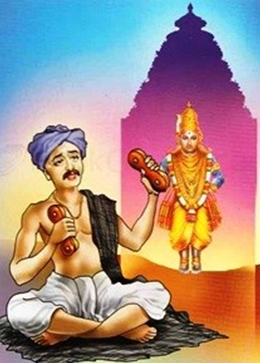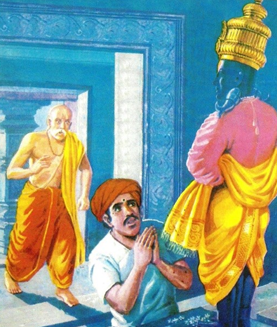Talk:Bhagavān Kṛṣṇa Blesses his Bhakta Puṇḍalika:Chokhāmelā (14th century CE)
By Vishal Agarwal
Chokha Melā was born in a low caste of Hindus. His profession was to remove dead animals from people’s homes and farms. Due to the nature of his profession, which he had inherited from his father, he was regarded unfairly as unclean and was not allowed to enter temples. However, Chokha Melā was a great bhakta of Bhagavān Vitthala of Pandharpur and spent his free time chanting His praises and composing songs to worship Him.
Sant Nāmadeva believed that all human beings have an equal right to worship Bhagavān. He accepted Chokha as his student. But the priests of the Maṇḍir would not allow Chokha to enter the Maṇḍir at all. Chokha Melā constructed a hut on the opposite bank of the river so that he could at least see the Maṇḍir from his home, and also the mūrti from the entrance door.
One night, Chokha Melā felt very sad at not being able to enter the Vitthala Maṇḍir. However, Bhagavān Vitthala spoke to him in his heart and said that people were foolish if they thought he could pollute the Maṇḍir just because he handled dead animals. Bhagavān said that if someone could pollute Him, then He would not be Bhagavān. He told Chokha not to despair, but to go to the Maṇḍir as He was waiting.
Chokha rushed to the temple, which had been locked for the night. Miraculously, the doors opened and Chokha entered it, spending the night singing bhajans until he fell asleep. In the morning, when the priest entered, he was shocked to see Chokha at the feet of the mūrti and ordered him to leave at once. But he felt guilty and quietly followed Chokha across the river.
From his hiding place, he heard Chokha Melā sing bhajans and Bhagavān Vitthala talking to Chokha in his heart. The priest thought it was just Chokha talking to himself. The priest became very angry. He entered the hut and slapped Chokha, saying that he was fooling people by pretending that Vitthala spoke to him, and told him not to come near the Maṇḍir again.
In reality, the priest was not able to see Bhagavān because his heart was not as pure as Chokha’s. Due to the blow, Chokha’s cheek became swollen. When the priest returned to the Maṇḍir, he was shocked to see that the cheek of the mūrti had become swollen. Clearly, the priest had hurt Bhagavān Vitthala by hitting Chokha.
He consulted with other priests and respectfully asked Chokha Melā to enter the temple. Once inside the Maṇḍir, Chokha Melā sang a song and asked Bhagavān to forgive the priests and heal His cheek.
After some time, Chokha Melā moved to a place called Mangalavedhā near Pandharpur. One day, he was constructing a wall, but the wall collapsed and killed him. Several other laborers who were working with Chokha also got killed.
Several years later, Sant Nāmadeva arrived and decided to give a grand funeral to this great bhakta of Bhagavān. But the problem was the separation of Chokha Melā’s bones from those of the other victims. Sant Nāmadeva picked one bone after another, and he separated Chokha Melā’s bones from the others because Sant Chokha Melā’s bones had the chant Vitthala Vitthala still coming from them.
Sant Nāmadeva took these bones to the Maṇḍir and buried them at the entrance. A blue-colored structure today stands at this site, and all visitors worship Sant Chokha Melā at this structure before entering the Pandharpur Maṇḍir.
Sant Chokha Melā’s life shows that Bhagavān does not discriminate between His bhaktas and loves everyone equally, irrespective of which family, gender, or profession one belongs to.



